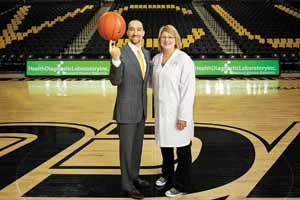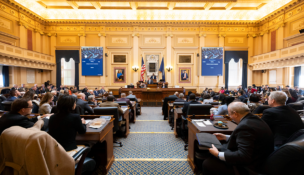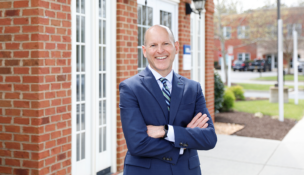Your name here
Corporate naming rights become more common on nonprofit buildings.
Your name here
Corporate naming rights become more common on nonprofit buildings.
The jokes began almost immediately last year when the General Assembly approved a plan to sell naming rights for the commonwealth’s roads and bridges.
“In Virginia, the road to a pothole-free ride may be over the Big Mac Bridge,” the Los Angeles Times chortled after passage of the legislation, designed to scrape up money for transportation funding.
State Sen. Richard L. Saslaw (D-Fairfax) predicted the 2012 naming rights bill would spark a trend. “You will see the Burger King High School, mark my words,” he quipped to reporters.
So far, no Virginia highways have been renamed as a result of the legislation. (The state Department of Transportation is trying to figure out how much such deals might be worth.)
Nonetheless, Geico’s gecko now appears on signs at the state’s 43 interstate rest areas, encouraging motorists to take a break if they need to make a phone call or send a text message. The auto insurer’s $2 million annual sponsorship, part of another state program, is helping keep rest areas open after 19 were closed in 2009 because of budget shortfalls.
Off the road, however, Saslaw’s prediction about the spread of company names on public buildings is coming true. Corporate naming rights are playing an increasing role in the financing of public projects in Virginia and elsewhere.
Since 2004, the business of naming rights has grown nationally from about $4 billion annually to about $10 billion today, according to Dig In Research, an Ontario-based firm that tracks corporate giving. A growing number of companies are being offered naming rights for donations to public institutions and nonprofit groups in need of a financial boost for ambitious projects.
In Virginia, company names are sprouting on facilities ranging from laboratories at a community college in Roanoke to a municipal auditorium in Richmond.
New name for a landmark
For what officials believe is the first time in its history, the city of Richmond entered agreements for corporate naming rights to help finance capital projects.
One of the highest profile arrangements involved a decision last year to offer naming rights to tobacco giant Altria Group for the city’s historic Landmark Theater, which opened in 1928 as The Mosque. Naming rights for the theater’s stage went to Dominion Resources, parent company of the state’s biggest electric utility.
The city began a $50 million renovation of the 85-year-old theater in July 2012. Contributions from Henrico County-based Altria ($10 million) and Richmond-based Dominion ($2 million) will help finance the project.
“The city’s budget did not have the resources to accomplish the $50 million renovation alone,” says Tammy Hawley, press secretary to Richmond Mayor Dwight Jones.
Hawley adds that permitting major companies to acquire naming rights to the theater was spurred by strong interest in “Broadway in Richmond,” a program that brings musicals and other performances to the region. “The Broadway in Richmond series has resulted in over $80 million in economic impact,” Hawley says.
Richard Parison, executive director of Richmond CenterStage, an arts organization that manages the Landmark Theater and other city venues, says corporate naming rights have become increasingly popular among performing arts groups during the past decade as many built or renovated facilities.
Corporations, he adds, have a variety of reasons for seeking naming rights with an arts group. The connection can help companies engage with the community; link their names with creativity, innovation and diversity; and assist them with employee recruitment, because many employees want to settle in areas with a lively arts scene. “It isn’t about a check,” Parison says. “It’s about quality of life and economic development.”
In other instances, a company might seek naming rights for a city convention center, as Delta Air Lines recently did in Milwaukee, to gain a higher profile and possibly increase market share, he adds.
A first for Altria
For some companies, naming rights for a capital project represents a new kind of philanthropy. That was the case for Altria. “It’s definitely a first for us. We typically don’t do capital projects,” says Jennifer Hunter, senior vice president for corporate affairs at Altria.
Hunter says Altria approached the theater project with care and deliberation. “We had to step back and say, ‘Is this the right thing for our employees? Is this the right thing for the community?’”
In the end, she says, Altria judged it to be “an amazing project” that would give the local economy a boost while improving the cultural and artistic life of the region. “We’re not seeking recognition. This is our home.”
Tom Farrell, Dominion’s CEO, says its gift also constituted a rare arrangement for his company. “This is an off-budget item, one of a kind,” he says.
Farrell believes the renovated theater represents “a significant contribution to the community” and emphasizes the donation was financed by the company’s shareholders, not by its customers.
Under their agreements with the city, Altria and Dominion have naming rights on the iconic theater and stage for 20 years and 10 years, respectively.
Redskins training camp
Besides naming rights for the Landmark Theater, the city last year entered into a high-profile naming rights agreement involving the Washington Redskins and the Bon Secours Virginia Health System, which owns seven hospitals in the Richmond and Hampton Roads areas.
City officials say the Bon Secours/Redskins initiative is an economic development strategy that, when fully implemented, will bring $40 million in real estate development for the city, about $18 million in additional payroll taxes, 200 to 300 new jobs and additional health-care opportunities for the community.
Bon Secours committed to a sponsorship package that, over 10 years, will include $3.2 million for the naming rights to what will be called the Bon Secours Washington Redskins Training Facility, which is being built by the Richmond Economic Development Authority.
A Bon Secours spokeswoman emphasized the money is not a charitable contribution. (Click here for related story on tax treatment of naming rights.)
Under its lease with the city, which carries a $2.2 million price tag, Bon Secours will establish a men’s health and sports medicine office in the facility, as well as headquarters for a community childhood obesity initiative, Movin’ Mania.
The $10.8 million training facility is under construction on 17 acres of state-owned land near the Science Museum of Virginia. The city says other funding will come from additional sponsorships and lease payments.
Besides its agreement with the city, Bon Secours has a separate agreement with the Redskins that permits Bon Secours — for an undisclosed payment — to have naming rights on the facility during the weeks the Redskins are in town preparing for the NFL season, and to continue its community outreach support.
Besides having its name on the training facility, Bon Secours has secured rights for a long-term lease on city-owned property (formerly a school) for a hospital expansion project.
City officials estimate that the Redskins summer training camp, to begin this year, will bring $8.5 million into the local economy and draw 100,000 fans.
VCU athletic village
Not far from Redskins facility, the Department of Intercollegiate Athletics at Virginia Commonwealth University in March announced the largest corporate gift in its history — $4 million from Richmond-based Health Diagnostic Laboratory Inc. In return, VCU sports facilities will be known as the “HDL Inc. Athletic Village.”

“HDL places an enormous value on saving lives and preventing disease through advanced testing, lifestyle change and the type of active living that is enhanced by the athletic village,” Tonya Mallory, HDL’s CEO, said in a statement when the donation was announced in March.
The week before the HDL gift was announced, Richmond-based packaging giant MeadWestvaco gave $3 million toward a proposed VCU basketball practice facility.
The company, however, decided not to have its name on the building. “MeadWestvaco received naming rights for its gift and chose to have the facility called The VCU Basketball Complex … We honored that request,” VCU Athletic Director Ed McLaughlin says.
Neither Health Diagnostic Laboratory nor MeadWestvaco returned calls for a comment on their gifts.
Community college gifts
Community colleges also are tapping the corporate market for naming rights.
At Virginia Western Community College in Roanoke, two nursing labs in the college’s new Center for Science and Health Professions Building will be named for the Friendship Retirement Community after a $150,000 donation.
“These are nurses who one day might be working with Friendship. So, it’s a win-win,” says Josh Meyer, a college spokesman, who notes that the college’s career center — the Hall Associates Career Center — is named for an area real estate firm.
Meyer says Virginia Western will be seeking more corporate naming rights agreements.
That also is the intention of the Virginia Farm Bureau, which recently acquired the venerable State Fair of Virginia. The nonprofit fair, which began in 1854, is offering naming rights on every building, corral and stable on its Caroline County fairgrounds, a former farm that is the birthplace of Triple Crown winner Secretariat.
Currently, the only naming rights partner is agricultural cooperative Southern States, whose name will appear on a 143-stall stable. “We’d certainly entertain any potential partner who would have an affinity for the State Fair,” says Greg Hicks, the Farm Bureau’s vice president of communications.
“These types of arrangements help bring added credibility as well as awareness to your organization or business,” Hicks explains. “After a short period, your name becomes synonymous with the venue.”
Indeed, an arm of the Farm Bureau, Virginia Farm Bureau Insurance has a naming rights agreement in the Hampton Roads area for a 20,000-seat outdoor amphitheater and concert venue, called Farm Bureau Live.
“Advertising can be cost-prohibitive in that part of the state,” Hicks says. “This gives us a way to reach the 1.6 million residents in that area of the state at a relatively affordable price over an extended period of time.”
In an opinion piece on naming rights for the University of Cincinnati Law Review, William Drennan, an associate professor at Southern Illinois University School of Law, notes that these days you can buy naming rights for nearly anything.
He cites a University of Colorado at Boulder decision to sell naming rights and a plaque to a second-floor men’s bathroom at the university’s ATLAS technology hub, in exchange for a $25,000 donation from venture capitalist Brad Feld.
Feld’s name appears on the plaque, along with this inscription, “The Best Ideas Often Come at Inconvenient Times — Don’t Ever Close Your Mind to Them.”
Donations by companies and corporate foundations
l



















